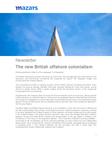
The new British offshore colonialism
The British Parliament, through the House of Commons, has just approved the amendment to the Sanctions and Anti-Money Laundering Bill proposed by Labour MP Margaret Hodge and Conservative MP Andrew Mitchel.
This amendment consists of obliging fourteen former British colonies (including the British Virgin Islands, the Cayman Islands, Gibraltar, Bermuda, Anguilla, Montserrat, Turks and Caicos, among others) to create, before 2020, a public registry where the beneficial owners of the companies incorporated there are disclosed.
Paradoxically, this measure does not cover the Channel Islands (such as Guersney, Jersey and Isle of Man) because, for historical reasons, Parliament cannot adopt measures affecting these territories. This measure is adopted as a further step taken by the British Government in the transnational fight against money laundering and has as a background the fact that most of the companies reported in the Panama Papers,
Paradise Papers and Malta Papers belong to such jurisdictions. Given the imminence of Brexit and the fact that the British Government must implement its own national protection measures, and that it has been detected that multiple Russian criminal networks use these companies to launder assets in the United Kingdom, this project became important. Also, given the delicate diplomatic relations between Russia and Great Britain following the assassination of the spy Skipal in Salisbury, the introduction of this issue on the legislative agenda - which had been shelved in previous debates - came back to life. Immediately, all former colonies protested, as many of them are now independent democracies. Thus, Orlando Smith, Premier of the British Virgin Islands, indicated that this constituted a "breaking point" in the relations between the two countries and that it could imply "the comprehensive review of diplomatic relations with England".
Likewise, Fabian Picardo, Chief Minister of Gibraltar, in a letter sent to the Parliamentary rapporteurs Hodge and Mitchells, indicated that "my Government considers that the use of unilateral orders of the Privy Council without our consent amounts to an unacceptable act of colonialism that could affect our democratic system". Similarly, David Burt, Premier of Bermuda, indicated that this order transgressed the advances made by Bermuda, as an independent democracy, over the past 50 years.
This Bill is being developed through an Order in Council of the Queen's Privy Council, a body constituted to act as the High Court of Appeal for all former colonies of the former British Empire and which now simply deals with some particular British Overseas Territories and Commonwealth matters.
Although the British Government has every right to promote changes in its anti-money laundering legislation, such a country -using a colonialist political mechanism- cannot order changes in other legislations over which it has no direct interference, since the only thing that this will generate will be the breaking of diplomatic and commercial relations between countries united by their history, culture and tradition.


